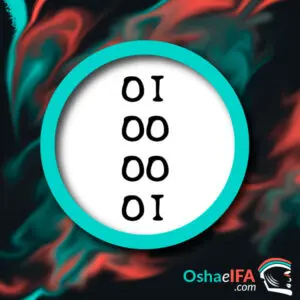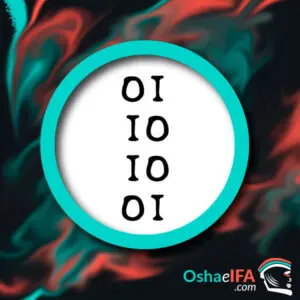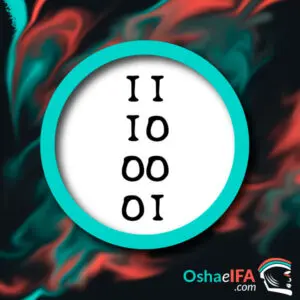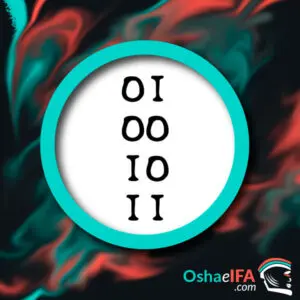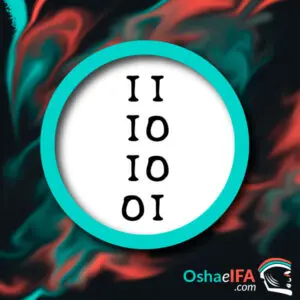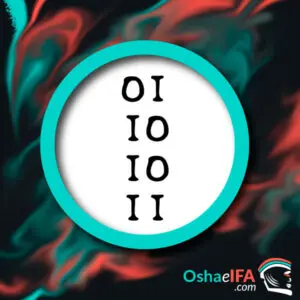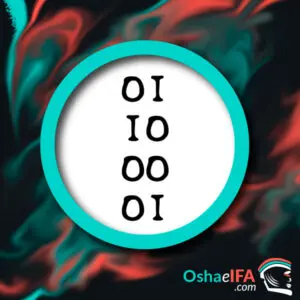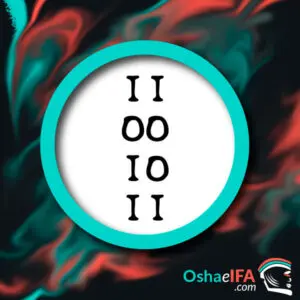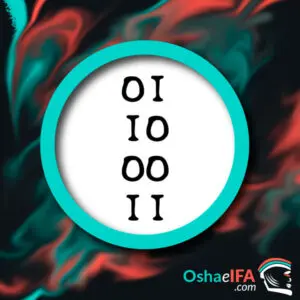Odi Bara (7-6): Analysis, Meaning, Sayings and Recommendations

Odi Bara (Obara), is Odu number 67 in the Lordly Order of Ifá, reveals crucial teachings about overcoming obstacles and the importance of precision in sacrifices. This sign stands out for its lessons on the dynamics of relationships, especially marriage, urging commitment as the key to harmony.
Overview of the Odu of Ifa Odi Bara
In the Odu Odi Bara, tragedy and hope, war and peace, as well as illness and healing, are intertwined. From the tragedy between Obatalá and Iku to the birth of marriage and the use of the deer leg in initiation rituals, this Odu covers a wide range of human and spiritual experiences.
Names or Aliases:
- Odi Obara.
- Hate Bara.
What is born in the Odu of Ifá Odi Bara?
- The tragedy between Obatalá and Iku.
- Marriage.
- The use of the deer's leg during the Ifá initiation ceremony.
- It is the Ifá of the duck (Ekuekueye).
- The chickens displaced the ducks.
- Talk about the peony war.
- Shango appeared on earth, born from the breasts of Obatalá.
- Dada Igbañi received Shango to raise him.
- A Orisha oko He was granted the power of the earth for finding Shango.
What does the Odi Bara sign talk about?
- Someone tries to knock him down.
- The person was born to be a slave.
- Tremors are experienced.
- Shango created Asheré with peonies.
- Odi Bara mentions the flower garden.
- Oduduwa created Ifá.
- It was established that in Dilogún only up to Eyinla is spoken.
The Odi Bara sign points out that:
- Obatalá saved his children in the bushes of Iwereyeye.
- It is necessary to use a necklace of 256 peonies.
- Odema Borobosile speaks, the Egun that accompanies this Ifá.
- Mentions vision problems.
- Iku (death) haunts the living.
- It is an Ifá of awareness of what has been done in life, whether good or bad.
You can read: Ifa Obara Dila sign
Analysis and Reflection of the Ifa Odi Obara sign:
Odi Bara tells us about transformation and the need to face challenges with wisdom. He reminds us that tragedies and conflicts, like those between Obatalá and Iku, are part of our existence, but they are also opportunities for personal and spiritual growth.
Economic Aspects:
This Odu highlights the importance of work and diligence, symbolized by the replacement of ducks by chickens, which invites us to adapt and be resilient to changes to ensure our prosperity.
Health:
It warns of health problems related to character and stress, such as tremors and vision problems, suggesting that emotional balance and stability are key to physical well-being.
Religious Aspects:
Odi Bara emphasizes the need for spiritual commitment, making appropriate sacrifices and respecting deities and ancestors. The story of Shango, born to Obatalá, teaches us about divine power and the importance of honoring our spiritual roots.
Personal Relationships (Love):
This Odu emphasizes the importance of marriage and committed relationships. The story of Obatalá, bringing men and women together after a conflict, reminds us that harmony in personal relationships is essential for stability and happiness.
Odi Bara is a sign of introspection, urging us to reflect on our actions and their impact on our lives and the lives of others. It teaches us that, through commitment, responsibility and respect for the sacred, we can overcome any adversity and reach a favorable destiny.
Discover the depth and wisdom of Obatala, the Yoruba deity of purity, peace and creation, exploring its teachings and meanings.
Recommendations:
- Make Appropriate Sacrifices: It is crucial to make the right sacrifices to avoid negative outcomes and overcome obstacles.
- Maintaining Commitment in Marital Relationships: Strengthening commitment and communication within marriage is essential to safeguard it.
- Respect and Honor Deities and Ancestors: Devotion and respect towards the deities, especially Orisha Oko, Shango, and Obatalá, are fundamental.
- Spiritual and Physical Protection: Wear the necklace of 256 peonies and receive Orishaoko as protection against adversities.
- Health Care: Pay attention to specific health problems, such as tremors and vision problems, always seeking the right balance and care.
Prohibitions:
- Don't Ignore Warning Signs: Ignoring the spiritual warnings and advice of Ifá can lead to fatal consequences.
- Avoid Impersonation and Envy: The story of the ducks and the chickens teaches us to avoid envy and malicious impersonation.
- Do not expose wet parts of the body to the sun: Specifically for women, take care of your breasts and avoid direct exposure to the sun.
- Do not Neglect the Care of your Partner: It is vital to protect and care for your partner, especially in contexts of risk or adversity.
- Avoid Abuse in Relationships: Abusing others, especially women with whom you are in a relationship, is prohibited and can have serious consequences.
Meaning of the Odi Obara Sign (7-6):
- In this Odu, there is a risk to the wife of Odi Bara, which requires her special protection.
- In Odi Bara, it is necessary for a person to be initiated into religion to serve the Saint, instead of being a slave to humanity.
- This sign is associated with suffering from tremors and chills.
- Contact with rainwater can result in illness.
- The person is being tracked, which could lead to his imprisonment.
- Odi Bara may have multiple partners, but he should not mistreat them so as not to put his own safety at risk.
- It is imperative to never ignore Orunmila's requests in this Odu.
- Caution should be taken with outsiders, as they could cause harm through witchcraft or aggression.
- The woman related to this Odu should wear an apron and dress in white as much as possible.
- This Ifá warns that there is someone trying to bring you down; It is crucial to protect your partner.
- This Oddun signals vision problems.
- According to this Odu, being the son of Oshun of the Yesa land, it is essential to perform Yoko Osha to ensure your protection and luck in life.
- The person may show signs of cowardice.
- This Ifá indicates that the person must marry if they currently live in concubinage.
- In this sign of Ifá, the person's fortune depends on satisfying the demands of Orunmila and his Apeterbi.
- Breaking an egg can transform a negative into a positive.
Sayings of the Odu Odi Bara:
- The peony does not know if it is left with black or red eyes.
- The dog has four legs and only takes one path.
- Marriage is a Palace that has two doors. The main one and the false one.
- What he does with his hands, he thwarts with his feet.
- Pretty woman, tragedy between men.
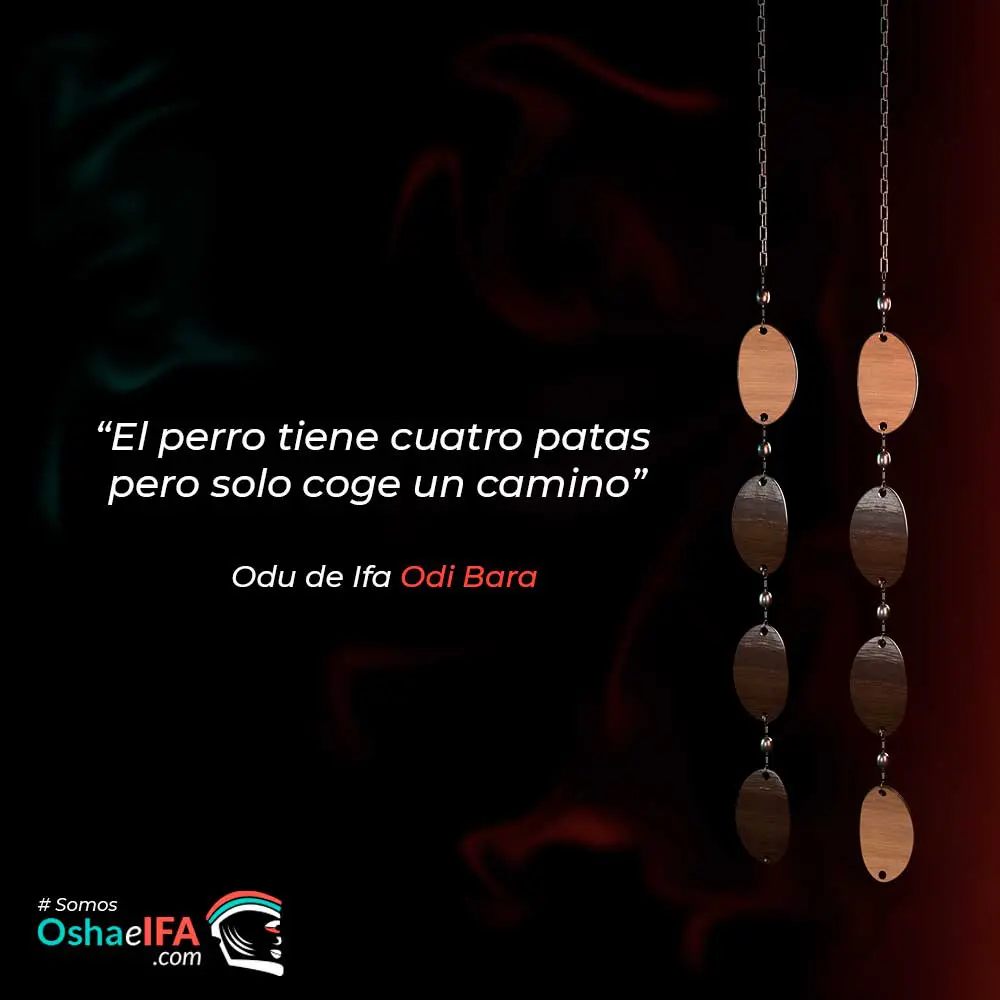
«The dog has four legs and only takes one path» It teaches us about decision and focus. Despite having multiple options or resources, wisdom lies in choosing a path and following it with determination, avoiding dispersion and guaranteeing success in our endeavors.
Ifa ethical code of the odu Odi Obara:
- The shadow of conscience pursues the murderers.
You can read: Odi Meyi sign
Ifa says in the odu Odi Bara:
When this Odun comes out in divination, the person would be told to take care of the middlemen's business, as the middleman who is supposed to help him, would harm him at work.
When this Odu goes out in the Ogbodu, the person would be advised not to eat the venison any more, and not to steal the things of others. Before completing the Ifá initiation ceremony, you must prepare your own Ogun throne. He would give a guinea fowl to his head while helping Ifá, to avoid being killed because of his own possession. In divination, the person would be advised to entertain Eshu with a goat as there is someone who is about to fight with you because of the same belonging.
When it comes out in divination, the person would be told to avoid something that was forbidden. If the person is ill or has been the victim of some misfortune, he or she should be persuaded to confess the forbidden thing that he or she has done.
When this Odun comes out in divination, the person would be told that she has an enemy that is as strong as the tiger, who is always watching her to destroy her and therefore should make the sacrifice that the birds made in order to escape to the evil plans of the enemy.
Prayer of the Odu Odi Obara:
ODI OBARA ADIFAFUN EKUEKUEYE OSHA ADARE WAYE ADAFUN ADIE
ORUGBO LODAFUN SHANGO ATI OBATALA.
Suyere by Odi Obara:
YEYE NIBO ONISHERE AYENIBAO NISERERE.
Know more Shango, the powerful orisha of thunder, justice and dance, and its impact on the Yoruba religion.
Treaty of the odu of Ifa Odi Obara
In this sign, Odi Bara, we are taught that whenever a person goes through difficult times, they must make their way through the herbs to leave the negative behind. It predicts that there will always be enemies trying to cause harm out of envy or revenge, but support will be found in elements of nature or in protective beings, like Obatalá, who saved his children from Iku (Death) by hiding them among the peonies, and when the enemies, emerged free of all evil.
In this Odu, death pursues the living, so it is recommended to wear a peony necklace and have a peony plant at home, placing a peony necklace inside your Ifá.
The Egun that accompanies this Ifá is called Odema Borobosile.
Odi went to war and upon arriving, found it over, managing only to rescue a beautiful woman.
This Odu celebrates the garden of flowers and is an Ifá Mafererun Orishaoko. The saints who speak in this Odu include Olordumare, Orishaoko, Olofin, Shango, Obatalá, Oduduwa, Oshun, Orunmila, Azojuano, Osanyin, Dada Igbaní, Iku and Eshu.
Here, in Odi Bara, the tradition of using the deer leg during the Ifá initiation ceremony began, using the deer in sacrifice as a substitute for human life.
This Odu emphasizes the importance of removing obstacles and correcting errors in sacrifices. Addresses problems of character and marital relationships, emphasizing the need for commitment to overcome difficulties.
It is a sign of supplantation, where ducks were replaced by chickens as food for the saints.
Odi Bara is also an Odu of war, where the black peony fought against the red one, creating a noise that, when heard by Shango, led him to capture them and create the Asheré.
This Odu narrates the tragedy between Obatalá and death (Iku), and how Shango appeared on earth, born from the breasts of Obatalá, thanks to Olordumare and Olofin.
Olofin gave Shango to Dada Igbaní (Catholic equivalent: Saint Rita of Acacia) for upbringing.
Orishaoko, while plowing the land, found Shango transformed into a lightning stone (Odu Ara) and gave him to Olofin, who then blessed Orishaoko, proclaiming him king of the earth forever.
Those ruled by this Odu are advised to receive Orishaoko; If this is not possible, you can keep a white and red painted tile on your home.
This sign advises taking care of the moist parts of the body from sun exposure and, especially for women, taking good care of the breasts.
Finally, after a war between men and women, Obatalá established marriage, saying that those who shared a bed must marry (Obeyawo).
This sign also explains why Iwereyeye leaves are used to replace any other missing herbs in an Osanyin Omiero, providing cleansing and protection from evil.
Ebbo of the Odu Odi Obara:
Odi Bara sign headwash (7-6):
A little Soapgrass grass is placed on the watchman and allowed to receive only the first rays of the sun the next day. Then, with this herb, Omiero prepares to wash his head.
In this context, the person has a hot head and has memory problems.
Cleaning the Odu Odi Obara:
A cleansing will be carried out with a chicken, which will be buried alive along with Ifá herbs, wet bread and nine chicken eggs.
Work for sickness:
OSANYIN will be given a dove.
You can read: All about the Odu Odi She
Pataki (stories) of the Odi Bara sign:
The goose that lays golden eggs
There was a man with sores on his legs who was treated by Orunmila for seven months, without showing improvement or worsening. For Orunmila, this man was like "the goose that laid the golden eggs", since what he charged for his services covered the expenses of his home.
One day, Orunmila had to leave to initiate some godchildren. The man, looking for Orunmila, went to his house and met Yemayá, Orunmila's wife. When explaining her problem, Yemayá recommended that she apply poultices with coastal vine. The man followed her advice, was cured and, in gratitude, gave Yemayá many gifts.
Upon his return, Orunmila learned from Yemayá about the healing and the gifts received. Orunmila reproached her, saying that she had killed the "goose that laid the golden eggs." Yemayá, confused, asked what she was referring to. Orunmila explained to him that the man had been covering household expenses with what he paid for his treatment. Then, Orunmila gave Yemayá some snails so that she could also make consultations, but only to a certain point (Eyila) and told her that she should leave the house, since she could not live with someone who knew more than him. Anything that exceeded that limit, she should be consulted with him. To Iban Eshu.
Explanation: History teaches us about ethics and integrity in the exercise of any profession. Greed and taking advantage of the vulnerability of others can lead to losing valuable resources and important relationships. Additionally, it highlights the importance of respect and equality in relationships, criticizing the idea that a person's knowledge or ability can be a reason for separation or discrimination.
Odi Obara Ifa Traditional
He made divination for the peasant and the deer (Agborin in Yoruba and Erhue in Benin).
The deer had developed the habit of feeding on a farm that had rich crops of yams, corn, and cassava. When the farmer discovered that his farm and especially his crops were in danger from the attack of the serfs, he decided to watch out for intruders.
For its part, the deer always knew when not to enter the farm since the farmer was nearby. Aware that her luck was not going to last forever, the deer decided to consult Orúmila's house, who advised him to entertain Esu with a goat and warned him never to go to the farm with his children. .
When the deer was ready to leave for his house, he spotted the peasant who was coming and went back to Orúmila's house. When she explained that the man on the way was the peasant she had told him about, Orúmila told him to hide in his room.
When the farmer entered, he told Orúmila that he had gone to see him to discover and capture the deer that was devouring his crops and his farm. He advised the peasant to entertain Esu with a goat and Ogun with a turtle. He also told him to tell the deer:
Latanbo, lole bo
adafa fun agbonrin
To fi oko ode sapo.
Orúmila told him that after making a sacrifice, he would set a trap on the path that deer normally follow to reach his farm. The peasant made the sacrifice quickly, but for his part the deer considered it unnecessary to make the sacrifice since he knew the peasant's strategy. He only thought that he should change his itinerary so as not to fall into the traps of the peasant. When Esu discovered that the deer had refused to sacrifice he decided to lure it to the route where the traps were placed.
The deer had told his youngest son to go ahead, contrary to everything advised in the consultation, not to go to the farm with his children. The trap captured the young deer and the mother managed to escape.
As a token of appreciation for his advice, divination and sacrifice made by him, the peasant brought the hand of the young deer to Orúnmila. This is how the tradition of using the hand of the deer during the initiation of Ifá began.
ÒDÍ ÒBÀRÀ
Ìdin ń se mi gèlé gèlé
Olobàrà ní ń se me gàlà gàlà
A dífá fun Òrúnmìlà
Níjó tí Bàbáń sawoó ròde Ènpe
Òde tónpetoun ń yìí
Or dáa fún or ńbè bí?
Wón ní kí Òrúnmìlà ó rbo
Wón ni yóó daa fun un
Òrúnmìlà rubo
Wón ní kó mó se iyè méjì o
Kó sì mó ja enìkankan níyàn
Wón ní bí on bá ti pé bó ti rí nìí
Kó móo pé bé ni
Nígbà tí Òrúnmìlà de òde Ènpe
hey hey
here give
Ìdin ń se mi gèlé gèlé
Olobàrà ní ń se me gàlà gàlà
A dífá fun Òrúnmìlà
Níjó tí Bàbáń sawoó ròde Ènpe
Ebo n won ni or se
Wón ní kéni mó jiyàn lÉnpe
Ìdin ò jiyàn la fawo da
Kéni mó jiyàn lénpe.
This is a lovely person who is planning to take a trip. He is doubting whether to make such a trip or not. Ifá says that he should go and not hesitate to do it again. Many good things abound for him abroad.
Ìdin ń se mi gèlé gèlé
Olobàrà ní ń se me gàlà gàlà
They prophesied Ifá for Òrúnmìlà
The day he was exercising his priesthood in the city of Ènpe
To this city, what am I going to,
Will it go well for me there?
They told him to make sacrifice
They told him that everything would work out for him
Òrúnmìlà made the sacrifice
They made it clear to him not to doubt himself or hesitate
And that he did not disagree with anyone
If they said…. This is so!
He must agree with them
When Òrúnmìlà arrived in the city Ènpe
The good fortune of commerce came to him
Ìdin ń se mi gèlé gèlé
Olobàrà ní ń se me gàlà gàlà
They prophesied Ifá for Òrúnmìlà
The day he was exercising his priesthood in the city of Ènpe
He was advised to offer sacrifice
They advised him not to disagree with anyone at Ènpe
Ìdin did not contradict anyone, the divination was made
Do not contradict anyone in the Ènpe city.


